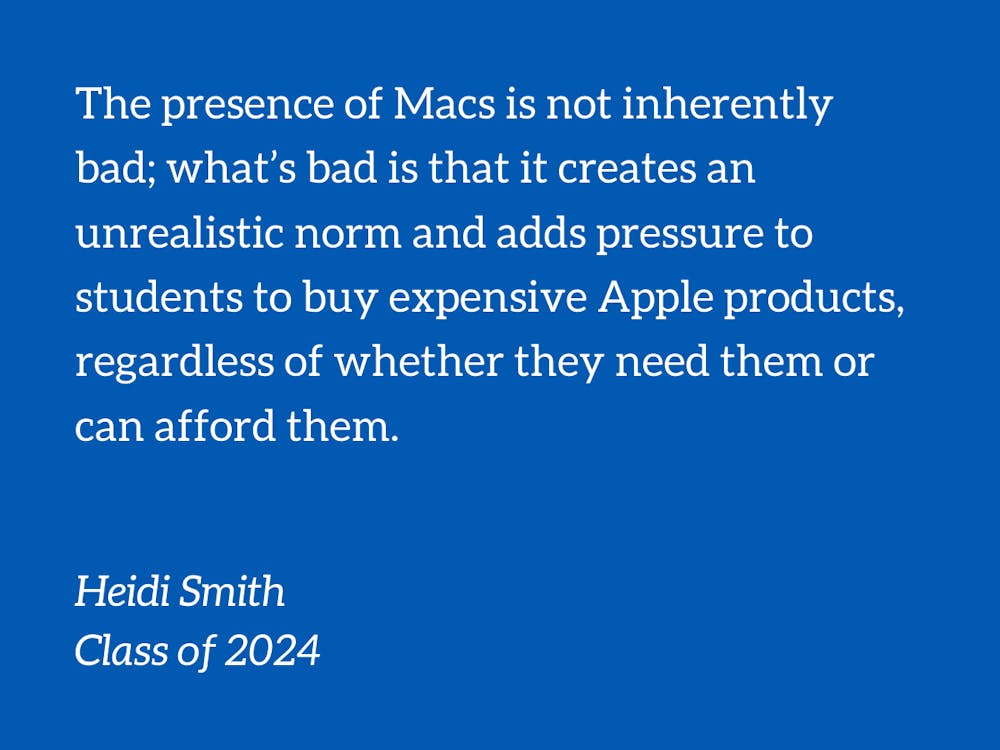Walk into any lecture hall here, and you’ll see what a fellow columnist described as a “sea of Macs.” Work out in Wilson gym, and more people than not are sporting some generation of AirPods. Swipe into your dorm, or pay for your food at WU, via Apple Watch. Be added to a text chat of 10 people and still have blue bubbles. Write the first draft of this column on an iPad with an Apple Pencil. Type it up on a MacBook. Welcome to Duke.
It seems every day the percentage of Apple-users increases, despite Mac OS holding only 15% of the world market share (iOS is higher, but still not the majority). Computers die and new ones are purchased, implicit social pressure is placed on students or the new Mac is out with USB ports again, and it just looks really sexy in those sleek advertisements. It seems like everyone we know has a Mac, but everyone we know here constitutes a very small, very privileged subset of humanity. As with other tangible consumables—think Air Force 1s or those claw hair clips—there is a tendency among young adults towards homogeneity, especially when the financial means are present, and thus here we are.
If I have a MacBook that I carry in my North Face backpack along with a HydroFlask, I can look the part of the average Duke student. That is to say, on the basis of my viewable belongings, I feel as though no one can question my status of belonging here, whether that is a rational thought or not. Whether a one-percenter or a financial aid student, material possessions offer a clear avenue through which you can feel like you fit in.
What makes an average Duke student? For the class of 2013, the median family income was upwards of $180,000; in today’s money, that equals roughly $227,380.06. Duke often cites the figure that 51% of students pay less than full cost, which I’m skeptical of for several reasons. Beyond the implication that roughly half of the student body does pay ticket price, “less than full cost” doesn’t imply grant aid—I’m assuming this figure includes students on athletic or merit scholarships, or on work study without need-based aid—although I can’t really say, given the obfuscative language. Regardless, the average Duke student is comfortably upper class and can fairly easily justify dropping one or two grand on a computer, but, definitionally, not everyone is the average Duke student.
As a financial aid student, having a MacBook and nice material possessions—along with, to my privilege, being white—allows me to pretend to be a wealthier individual than I actually am. It doesn’t matter if it’s logical—similar to why I always wear presentable outfits to class instead of sweatpants and hoodies—or whether anyone actually notices how I look or what I have. But it just becomes one fewer thing to worry about, so why wouldn’t I, and anyone who feels similarly, switch to Mac?
Macs are a luxury good, as Apple is a luxury brand, and that philosophy is reflected in the quality and cost of their products. I am all for purchasing goods that may be a bit pricier if they last much longer, rather than needing more frequent replacements for cheaper goods—which leads to more electronic waste, most of which is not recycled. However, this is a consumption philosophy that necessitates the means to purchase the superior good, which, for many, is not the case (and I expect the endemic of Macs is more than just everybody’s computers dying at once). The presence of Macs is not inherently bad; what’s bad is that it creates an unrealistic norm and adds pressure to students to buy expensive Apple products, regardless of whether they need them or can afford them. Unlike thrifting clothes, it’s not in vogue to have a refurbished, hand-me-down or non-name brand laptop—it appears that caring about environmental impact is often only important so much as it’s trendy.
There are enough factors that go into choosing a computer that the MacBook ubiquity has to be something more than just the specs/price balance, because, for the general user, I’m not sure that Apple would win that game. Certainly, the place of Apple products as a status symbol and the quality that comes with a product of such a price helps, but as banal as it seems, a key to this whole thing might just be iMessage. Simply put, the ability to text via laptop, along with other Apple ecosystem perks like AirDrop, is nearly enough to make the product worth it alone. Throw in the ability to do practically anything Windows or Linux does, and it is no competition. Think about a world in which Mac OS and iOS have the compatibility of Windows and iOS—could you still justify a MacBook? That modicum of additional convenience seems to be enough, for many of us, to tip the scales.
With the iPhone, a gateway drug of sorts, I’m reminded of the children’s book "If You Give a Mouse a Cookie"—but instead it’s if you give a Duke student an iPhone, eventually, they’re going to want a MacBook. Personally, I find Apple products enjoyable to use, and find luxury electronics a worthy investment of money, given the amount of time I must spend using them, but perhaps I’m just justifying my own indulgence. It's an ingenious business strategy on the part of Apple, cultivating this type of brand loyalty and hype, but I have to wonder how we all seemed to reach the same electronics-related conclusions at once.
Heidi Smith is a Trinity sophomore. Her columns run on alternate Wednesdays.
Get The Chronicle straight to your inbox
Sign up for our weekly newsletter. Cancel at any time.

